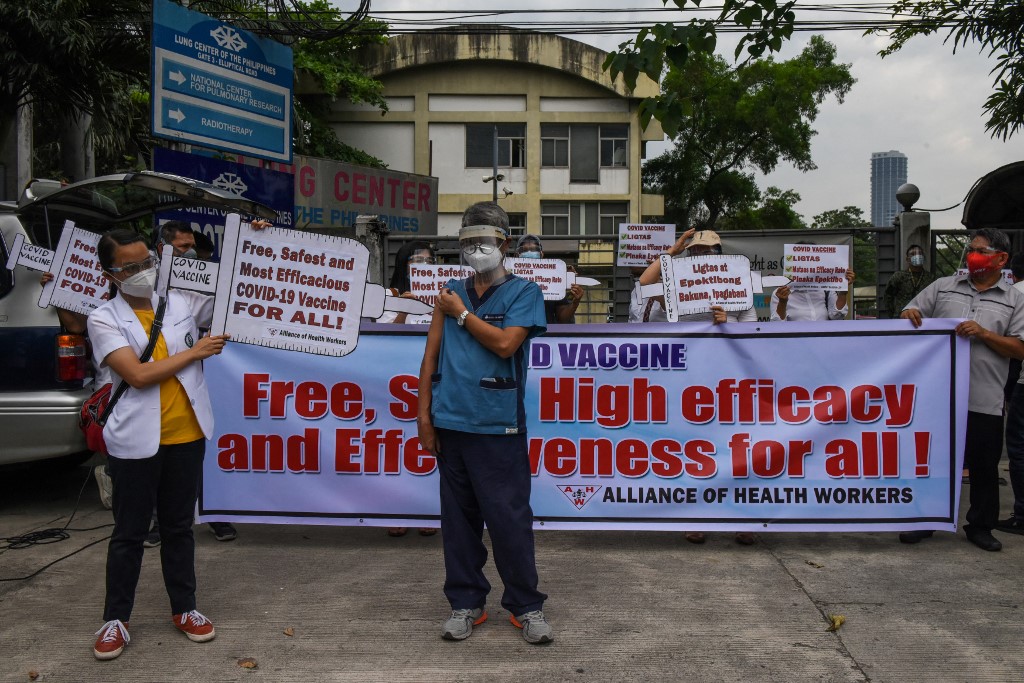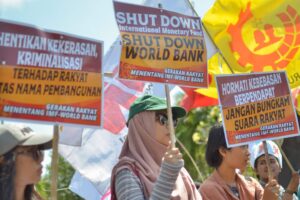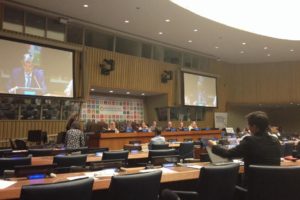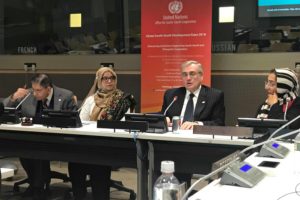Growing inequality is evident in the rollout of COVID-19 vaccines. The vaccines, most of which have been developed and patented by transnational corporations (TNCs), are currently hoarded in large amounts in rich countries at the expense of the global South. Most of the vaccines developed by TNCs have their roots in publicly-funded research yet are privately owned. These TNCs prioritise profits and perpetuate inequalities as elite interests are the first in line, and will lead to a prolonged health crisis.
More than a year since the World Health Organization (WHO) declared the COVID-19 outbreak as a global pandemic, the neoliberal framework has been fully exposed as a system that has long prioritised profit over people. It highlighted how the current system disregards working people’s rights, especially to health and to social services. As the world suffers from COVID-19, it is also being plagued by an epidemic of growing inequality and barriers to people’s rights.
IBON International is highly concerned that global leaders and the dominant economic system are more than willing to prolong the neglect of people’s rights. More people are being driven further into poverty as workers from developing nations and even richer countries are being laid off—making for more precarious and exploitative situations.
The World Bank claims that the expected number of newly impoverished people this year would range from 119 and 124 million. International Labour Organisation (ILO) analysis on the decline of global working hours, shows an 8.8% decline relative to the fourth quarter of 2019, or around 255 million full-time jobs lost—four times greater than during the Global Financial Crisis in 2009.[i] The losses from this employment crisis were still unequally higher for women (5.0%) and for young workers (8.7%) than for men (3.9%) and the older workers (3.7%), respectively. Meanwhile, nearly 500 people became billionaires over the course of lockdowns worldwide[ii].
This growing inequality is also evident in recent months’ rollout of COVID-19 vaccines. The vaccines, most of which have been developed and patented by transnational corporations (TNCs), are currently hoarded in large amounts in rich countries at the expense of the global South. Even the WHO has criticized this “shocking imbalance” in the distribution of coronavirus vaccines between rich and poor countries. Their COVAX scheme, which aims to vaccinate 20% of the global population by the end of 2021, remains limited as governments make deals with giant pharmaceutical corporations to stake claims on large portions of vaccine supplies.
Although it is indeed a gross imbalance, not one bit of it is shocking. Most of the vaccines developed by TNCs (such as Pfizer, Moderna, and Johnson&Johnson—all based in the US, among others) have their roots in publicly-funded research yet are privately owned. Patents and intellectual property rights limit production and monopolise what should be public needs. These TNCs prioritise profits and perpetuate inequalities as elite interests are the first in line, and will lead to a prolonged health crisis.
IBON International reiterates the need for pandemic responses that are based on people’s rights and not corporate interests nor the repressive agenda of elite-led states. We demand to end the intensified lockdowns prevalent in the global South. Repression should not be the rule today; people’s voices and spaces are crucial in setting the agenda in economic and health questions as states talk about “recovery.”
The interdependence between the economic crisis and the growing human rights abuses today becomes more apparent as governments, including in the global South, continue to respond to the pandemic with continuing lockdowns. Such regimes concentrate power to the military and police to uphold lockdowns, resulting to rights violations, such as in the Philippines. Today, basic rights to expression are affected in 56 countries, and rights to assembly in 159 countries, according to CSO studies.[iii]
IBON International reiterates the need for pandemic responses that are based on people’s rights and not corporate interests nor the repressive agenda of elite-led states. For instance, patents which limit mass availability of medicines and vaccines are protected by WTO rules that need to be waived and even dismantled, particularly the Agreement on Trade-Related Aspects of Intellectual Property Rights (TRIPS). IBON International also demands to end the intensified lockdowns prevalent in the Global South. Repression should not be the rule today; people’s voices and spaces are crucial in setting the agenda in economic and health questions as states talk about “recovery.”
Long-term changes are urgent to better the welfare of people from the global South amid the COVID-19 pandemic and beyond. We continue to call for fulfilling historical commitments on aid flows, the need for progressive taxes on wealth and big business, and the reversal of neoliberal trade and investment. Especially needed would be debt cancellations for Southern countries, especially as many had been forced to adopt tougher austerity measures which are deeply affecting their public healthcare systems, pension schemes, and public sector wage freezes. This is as CSO analyses show that 76 out of the 91 IMF loans with 81 countries since the pandemic have driven stricter austerity rules.[iv]
The IMF itself has admitted that austerity worsens poverty and inequality as it encourages loan recipient countries to roll-back public spending. Nine of these countries, including Angola and Nigeria, are expected to introduce or increase value-added taxes (VAT) to common products like food, clothing, and household supplies—disproportionately impacting on poor people. A total of 14 more countries are also likely to bring in wage cuts and layoffs for their already reduced public staff particularly in the healthcare sector. This issue also extends to the gendered wage gap, as majority of these healthcare workers are women—whose “invisible work” has already been serially undervalued and underpaid despite contributing at least USD10.8 trillion a year to the global economy.[v]
The way forward is clear: the need for a system overhaul to be founded on people’s rights, including to health, sovereignty and development. In the end, it is crucial for peoples and their organisations to assert their right to shape economic, health, and governance trajectories as their rights, lives, and futures are at stake.
As the pandemic continues and new COVID “variants” appear, opportunities for shifting beyond current international norms and elite-led national systems should be welcomed with open arms—an ambition required amid systems that has long prioritised profit. The current neoliberal norms of trade and investment liberalisation, the privatisation of services, the deregulation of economies, along with repressive governments, have already shown their gross incoherence with people-centred, sustainable development.
The way forward is clear: the need for a system overhaul to be founded on people’s rights, including to health, sovereignty and development. In the end, it is crucial for peoples and their organisations to assert their right to shape economic, health, and governance trajectories as their rights, lives, and futures are at stake.#
[i] ILO. 2021. ILO Monitor: COVID-19 and the world of work. Seventh edition. https://www.ilo.org/global/topics/coronavirus/impacts-and-responses/WCMS_767028/lang–en/index.htm
[ii] Forbes. World’s Billionaires List 2021. https://www.forbes.com/billionaires/
[iii] ICNL. COVID-19 Civic Freedom Tracker. https://www.icnl.org/covid19tracker/
[iv] Oxfam. 2020. IMF pavesway for new era ofausterity post-COVID-19. https://www.oxfam.org/en/press-releases/imf-paves-way-new-era-austerity-post-covid-19
[v] Oxfam. 2020. Time to Care: Unpaid and underpaid care work and the global inequality crisis. https://dx.doi.org/10.21201/2020.5419



